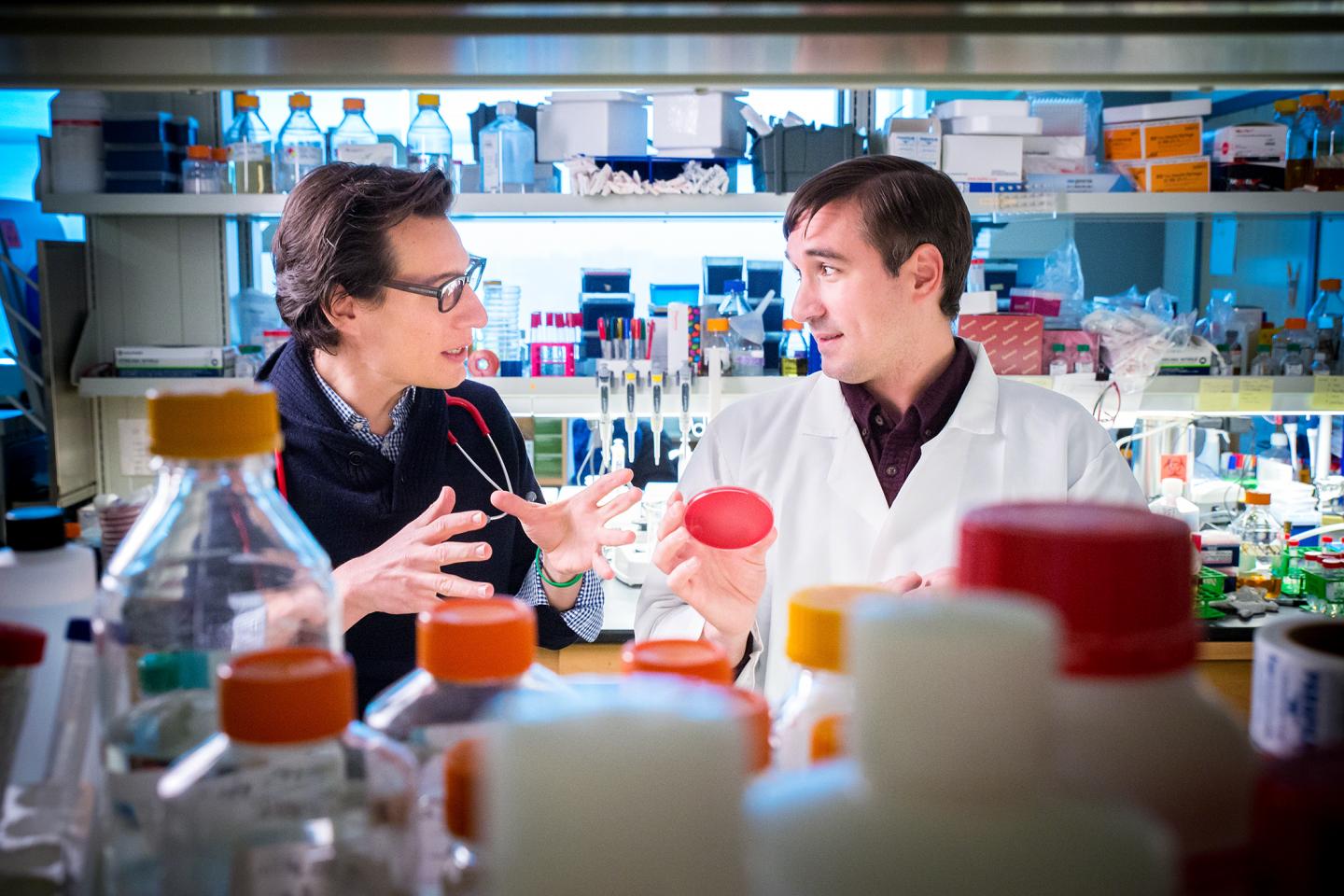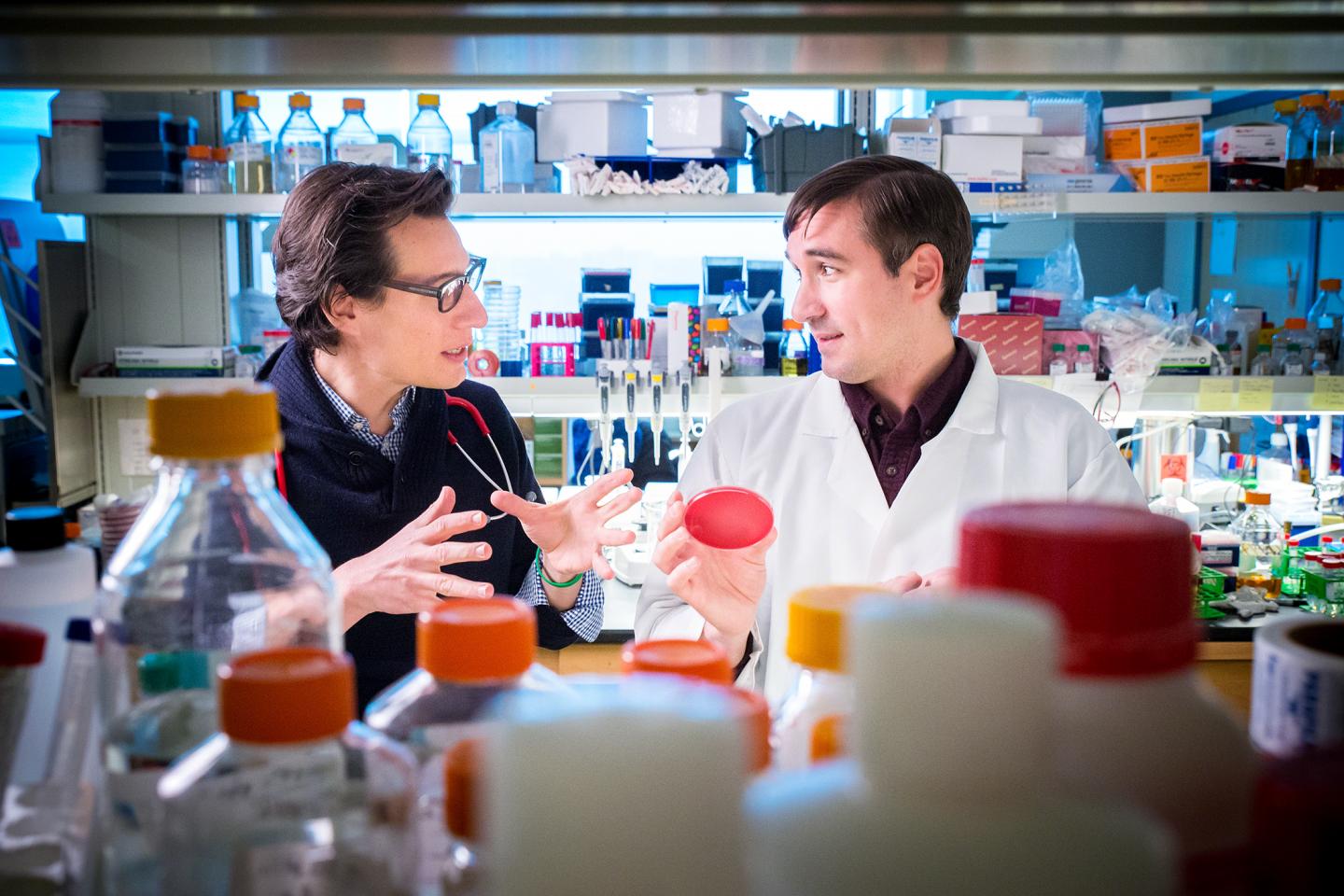
Credit: St. Jude Children's Research Hospital / Peter Barta
The quest to understand a prolonged infection in an infant being treated for leukemia has led to the St. Jude Children's Research Hospital discovery of a mutation that allows bacteria to tolerate normally effective antibiotic therapy. The report appears today in the scientific journal mBio.
"These findings detail a 'perfect storm' for development of antibiotic tolerance by bacteria that already pose a clinical challenge," said corresponding author Jason Rosch, Ph.D., assistant member of the St. Jude Department of Infectious Diseases. Added co-corresponding author Joshua Wolf, MBBS, assistant member of the same department: "The same conditions may be present in other patients with immune systems that have been compromised by chemotherapy or disease."
The "perfect storm" involved a St. Jude patient who was six weeks old when she was diagnosed with acute myeloid leukemia. The cancer treatment wiped out her white blood cells, which help protect against infection, and despite infection-control measures, she developed a blood stream infection with vancomycin-resistant Enterococcus faecium (VRE). The infection persisted for 28 days, and only resolved after her immune system recovered. She then successfully completed cancer treatment.
In-depth DNA sequencing of 22 VRE samples collected during the patient's infection helped researchers link the prolonged infection to a point mutation in the relA gene of VRE.
The mutation inappropriately activated the stringent response pathway, which bacteria use to survive under stress and to tolerate antibiotics. The mutation resulted in elevated levels of the signaling molecule alarmone. The increased alarmone likely primed the bacteria to survive exposure to multiple antibiotics, researchers said.
Although conventional laboratory tests suggested that the mutant VRE should remain susceptible to the antibiotics used to treat the infection, special research tests showed that the relA-mutant VRE tolerate significantly higher doses of antibiotics than the original strain when the bacteria grew in slimy colonies called biofilms.
Bacterial biofilms develop on catheters, heart valves and other surfaces in the body. Biofilms feature dormant cells called persister cells that are shielded from the immune system and are tough to eradicate with available antibiotics.
"This mutation has particular clinical significance because the antibiotics involved, linezolid and daptomycin, are the last line of defense against VRE infection," Wolf said.
Among the promising compounds in development for treatment of bacterial biofilms is the experimental antibiotic ADEP-4. It works by activating an enzyme to kill persister cells and eradicate bacterial biofilm.
Researchers in this study reported that ADEP-4 killed relA-mutant and non-mutant VRE growing in biofilm in the laboratory. "In the future, compounds like ADEP-4 may provide a new approach to resolving persistent infections," Wolf said.
Evidence gleaned from tracking the evolution of VRE throughout the infection suggested the patient's immune-compromised state was essential to survival of the mutant VRE, Rosch said. Gene transcription was altered significantly in relA-mutant VRE and produced biofilms that were less robust and possibly unlikely to otherwise survive.
"The case expands our understanding of the role of the stringent response in susceptibility and tolerance to a wide range of antibiotics, especially in biofilms," Rosch said. "It also demonstrates that these mutations can develop and gain a foothold during a human infection."
###
The first authors are Erin Honsa, Ph.D., of St. Jude, and Vaughn Cooper, Ph.D., of the University of Pittsburgh. The other authors are Mohammed Mhaissen, Matthew Frank, Jessica Shaker, Amy Iverson, Jeffrey Rubnitz, Randall Hayden, Richard Lee, Charles Rock and Elaine Tuomanen, all of St. Jude.
The research was funded in part by grants (1U01AI124302, 1RO1AI110618, R01GM034496, AI27913, AI12111585, R01AI111449) from the National Institutes of Health; and ALSAC.
Media Contact
Jann Ingmire
[email protected]
901-595-6384
@StJudeResearch
http://www.stjude.org





